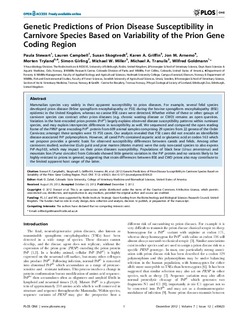Genetic Predictions of Prion Disease Susceptibility in Carnivore Species Based on Variability of the Prion Gene Coding Region
Stewart, Paula; Campbell, Lauren; Skogtvedt, Susan; Griffin, Karen A.; Arnemo, Jon Martin; Tryland, Morten; Girling, Simon; Miller, Michael W.; Tranulis, Michael A.; Goldmann, Wilfred
Journal article, Peer reviewed
Permanent lenke
http://hdl.handle.net/11250/134448Utgivelsesdato
2012Metadata
Vis full innførselSamlinger
Originalversjon
Stewart, P., Campbell, L., Skogtvedt, S., Griffin, K. A., Arnemo, J. M., Tryland, M., . . . Goldmann, W. (2012). Genetic Predictions of Prion Disease Susceptibility in Carnivore Species Based on Variability of the Prion Gene Coding Region. PLoS ONE, 7(12). doi: http://dx.doi.org10.1371/journal.pone.0050623 http://dx.doi.org/10.1371/journal.pone.0050623Sammendrag
Mammalian species vary widely in their apparent susceptibility to prion diseases. For example, several felid species developed prion disease (feline spongiform encephalopathy or FSE) during the bovine spongiform encephalopathy (BSE) epidemic in the United Kingdom, whereas no canine BSE cases were detected. Whether either of these or other groups of carnivore species can contract other prion diseases (e.g. chronic wasting disease or CWD) remains an open question. Variation in the host-encoded prion protein (PrPC) largely explains observed disease susceptibility patterns within ruminant species, and may explain interspecies differences in susceptibility as well. We sequenced and compared the open reading frame of the PRNP gene encoding PrPC protein from 609 animal samples comprising 29 species from 22 genera of the Order Carnivora; amongst these samples were 15 FSE cases. Our analysis revealed that FSE cases did not encode an identifiable disease-associated PrP polymorphism. However, all canid PrPs contained aspartic acid or glutamic acid at codon 163 which we propose provides a genetic basis for observed susceptibility differences between canids and felids. Among other carnivores studied, wolverine (Gulo gulo) and pine marten (Martes martes) were the only non-canid species to also express PrP-Asp163, which may impact on their prion diseases susceptibility. Populations of black bear (Ursus americanus) and mountain lion (Puma concolor) from Colorado showed little genetic variation in the PrP protein and no variants likely to be highly resistant to prions in general, suggesting that strain differences between BSE and CWD prions also may contribute to the limited apparent host range of the latter.
